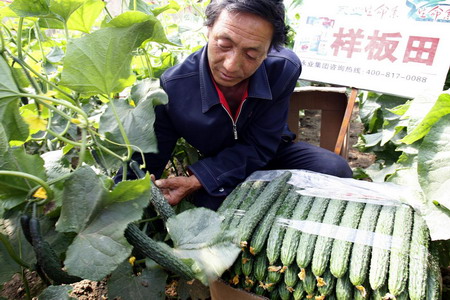Newsmaker
Fruits of a growing ambition
By Yu Tianyu (China Daily)
Updated: 2010-07-12 09:58
 |
Large Medium Small |
|
 |
|
A farmer who uses Shengmingsu produced by Wu Zishen's Yongye International harvests cucumbers on his farmland in North China's Inner Mongolia autonomous region. [Zhang Wei / China Daily] |
Yongye's products boost farmers' yields by up to 35 percent, says CEO Wu Zishen
BEIJING - It was an early morning in December last year and a bronzed middle-aged Chinese man, dressed in a plain suit and worn, dusty shoes, was walking across the bustling heart of the US financial district, Wall Street.
No one paid him particular attention, no doubt burdened as they were with their own worries during those dark days of the global financial crisis.
But unlike many that gloomy morning, Wu Zishen was a walking financial success story.
He was on his way to ring the Nasdaq stock market opening bell in recognition of the success of his plant nutrient company that boasts of boosting production for farmers by 10 to 35 percent.
What's more, he won the applause of the picky investment bankers in the midst of the most difficult time for the international economy for very many years, raising more than $100 million in funds.
Yongye International Inc, a Chinese organic agricultural nutrient company headquartered in Beijing, with its production facilities located in Hohhot, the capital city in North China's Inner Mongolia autonomous region, has played a clever game in the international market.
Prior to its Nasdaq listing, the company was successfully floated on the Over-The-Counter Bulletin Board electronic quotation system for stocks in the US in April 2008 with an initial public offering that earned the company more than $10 million. Five months later, as Lehman Brothers collapsed and the global economy fell into crisis, the company again attracted another $9 million in investments.
Wu, chairman and chief executive officer of Yongye International, said: "Our success is due to an excellent business model, good products and integrity, no matter how gloomy the economy is."
Yongye markets two lines of organic nutrient products: a liquid that is sprayed on plants to increase their yield and a powder that is added to animal feed to improve the health of livestock. Both products are sold under the brand name "Shengmingsu", which means "life essential" in Chinese.
"Soil erosion, the use of pesticides and improper farming measures cost billions of dollars in lost profits for Chinese farmers every year," said Wu. "Our business aims to solve the problems that 900 million Chinese are facing. That is the major engine of our business," he told China Business Weekly in his characteristic deep voice.
Chinese farmers
Although he was born in Hohhot, Wu didn't have a very clear picture of the life of Chinese farmers until he joined a poverty-relief project in 1994 when he worked at a local government department.
"The family of five only had two pairs of trousers to wear and their miserable life was something that I had only read about in textbooks. I used to think the poverty of Chinese farmers might be down to laziness but at that moment I realized it was mostly generated by irresistible natural disasters. I resolved to do something for them."
Wu was a disciple of Qian Xuesen, a renowned Chinese scientist, who used to say that the sixth industrial revolution would focus on biotechnology and its battlefields would very likely be the deserts, prairies and oceans.
This was in the 1990s, after then-leader Deng Xiaoping had made his famous southern tour and inaugurated the market reform process.
The government followed suit by initiating supportive policies that allowed officials and civil servants to go into business on their own in a movement that the Chinese dubbed "going to sea".



